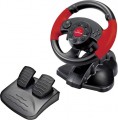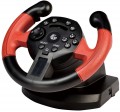Number of buttons
The total number of buttons provided in the design of the manipulator.
The more buttons — the more additional features you can "tie" to the manipulator, the lower the likelihood that during the game you will have to turn to other controls (for example, a PC keyboard). However, many game consoles (see "Platform Compatibility") provide a certain minimum number of buttons for a compatible gamepad — a smaller number simply would not allow full use of all the functions of the console. For example, the original PlayStation 4 controller has 11 buttons.
Note that the D-Pad (see below) is not included in this calculation: it is considered a specific control, although it is based on buttons.
Feedback
The type of feedback provided in the design of the manipulator (if any).
Feedback is the reaction of the manipulator to certain events occurring in the game. This reaction enhances the "immersion effect", giving the player the impression that he is holding on to a real airplane handle, car steering wheel, etc. It can be like this:
—
Vibration. Feedback in the form of vibration allows you to simulate, for example, shaking from off-road driving, aircraft trembling when firing from airborne weapons or entering a turbulence zone, etc.
— Power.
Force feedback controllers are able to create some resistance to the efforts of the player — for example, to simulate the difficulty in turning the steering wheel when the wheels are stuck in the mud.
— Vibration / power. Controllers that support both types of feedback described above. This option is the most advanced and at the same time the most expensive.
Steering wheel turn
The angle of rotation of the steering wheel in the manipulator-steering wheel (see "Device type"). This parameter is measured over a general range — from one extreme point to another; accordingly, the angle of rotation from the middle position will be half the total. For example, a figure of 180° means that the steering wheel is capable of turning to the right and left by 90°.
Both the general level and the purpose of the steering wheel directly depend on this parameter. Models with a rotation angle of up to 270° are predominantly entry-level and are intended mainly for fans of arcade racing without much emphasis on realism, as well as for children and novice gamers. In more advanced rudders, the steering angle is already
900 °, or even 1080 °. These numbers are taken for a reason — they correspond to the steering wheel ranges in most production cars (900 °), as well as some sports supercars (1080 °). Thus, such characteristics make the use of the steering wheel as realistic as possible — on the other hand, they significantly affect the cost.
The steering wheel rotation range can be adjusted by the
steering wheel angle adjustment function (if such a feature is implemented in the game controller). The option is configured either directly in the game, or through the software that controls the operation of the steering wheel.
Table mount
A method of attaching a game pad to a table or other surface. Note that not all types of devices (see above) use mounts — gamepads, for example, do not need them by definition, and the pedals are made on a massive stable base and installed on the floor, so they also do not need latches. In other cases, the following options may be provided:
—
Suckers. Classic suction cups that "stick" to the surface of the table. Such fixtures require a fairly flat surface, but in most cases this is not a problem, given the materials used for modern tables. Another advantage of suction cups is that they can be mounted anywhere on the table — not necessarily on the edge, as is the case with many clamps. Among the disadvantages of this option, one can name the fact that as the material of the suction cups wears out, it loses its elasticity, and the reliability of fastening decreases — especially with frequent attachment / detachment. On the other hand, in most cases, the period of effective operation of suction cups is quite comparable with the life of the manipulator itself, so this disadvantage is usually not critical.
—
Clamps. Clamps usually take the form of characteristic clamps that allow you to mount the device on the edge of the table top or in another similar place. The main advantage of this option can be called reliability: firstly, a well-clamped clamp holds the manipulator in place much more tig
...htly than suction cups, and secondly, the quality of fastening practically does not deteriorate even with frequent attachments and detachments. On the other hand, the clip can only be used on the edge of a tabletop or on a special stand, which limits the choice of where to install the game pad.
— Bolts. A specific variant used mainly among high-end flight simulator instruments (see "Device type"); almost never found in other types of controllers. With the help of bolts, the instrument clusters are installed in a special rack that imitates the cockpit of an aircraft.
There are models that allow several mounting options: for example, the steering wheel with suction cups can also be equipped with a clamp, which allows you to choose the option at the discretion of the player.
